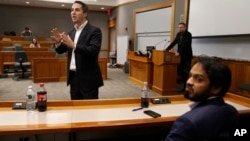Organizers of a federal pilot program designed to root out homegrown extremists are looking to lessons learned in Europe, where government programs to confront radicalization have been in place for years but continue to generate debate.
Boston's version of the Countering Violent Extremism program brought in experts Tuesday to discuss efforts in the United Kingdom and Germany that have brought youths and others vulnerable to extremist ideology into family counseling before they could join the Islamic State or other militant groups.
But Muslim activists attending the event questioned the science behind the overseas efforts and argued that trying to identify possible extremists based on their comments or actions would trample on free speech and other basic American civil rights.
“We have deep, fundamental concerns because of a lack of empirical evidence that you can predict criminal behavior based on certain actions or beliefs,” said Shannon Erwin of the Muslim Justice League.
The Obama administration launched the Countering Violent Extremism program more than a year ago with pilot efforts in Boston, Los Angeles and Minneapolis. The programs have rolled out slowly, in large part because of concerns from activists that they effectively amount to government surveillance of Muslims.
Event speakers Tuesday noted that sharing Islamic State propaganda on social media or believing that holy war is the truest form of Islam, for example, represent real warning signs of extremism.
“You've got to be realistic about this,” said Rashad Ali, a senior fellow with the London-based Institute for Strategic Dialogue. “And being realistic is not putting your head in the sand and denying the facts that are in front of us.”
U.S. Attorney for Massachusetts Carmen Ortiz, whose office is heading the Boston version of the Countering Violent Extremism program, stressed that none of the European initiatives were being actively pursued in Boston or elsewhere in the U.S. at this point.




